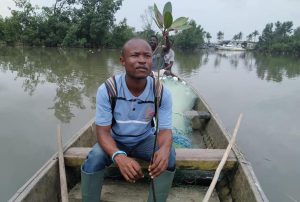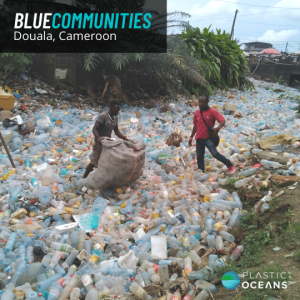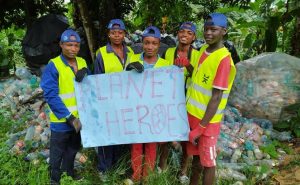Environment and Food Foundation has removed over 11,000 pounds of plastic waste from rivers in Douala
The sun has barely risen in Douala, Cameroon, but Achare Elvis Ayamba has been working for hours. Donning latex gloves and protective boots, he wades into the river in front of him — or, what used to be a river.
After decades of rapid industrial development in Douala, spaces like these have become dumping grounds for plastic bottles and other waste. Many have given up trying to clean them, but with a team of motivated volunteers around him, Ayamba is just getting started.

Achare Elvis Ayamba on river patrol in Douala, Cameroon. Photo: E2F
He is the founder and executive director of the Environment and Food Foundation (E2F), a nonprofit organization working to promote socio-economic and environmental initiatives across Douala. He was also just named one of the Top 100 Young African Conservation Leaders by a coalition including the African Wildlife Foundation (AWF) and World Wide Fund for Nature (WWF).
Douala — which is home to over 2.7 million people, as well as Central Africa’s largest port — is the commercial and economic capital of not only Cameroon, but the entire Central African Economic and Monetary Community (CEMAC) as well. As the region’s exportation industry exploded, pollution has become a major issue, transforming many ecological areas around Douala into toxic wastelands — a degradation that Ayamba has witnessed personally.
“My concern for local ecosystems began when I was undergoing professional training in fishing and aquatic services. While conducting field studies in national parks, mangrove forests, and rivers across the region, I saw first-hand the impacts of not only pollution, but of other consequences of economic expansion as well, such as deforestation, illegal poaching, and overfishing. After seeing these damages year after year, I couldn’t escape the thought: ‘how can I be a part of the solution?’”

The community of Douala is faced with a daily flow of plastic pollution.
Inspired, Ayamba founded E2F with a group of colleagues as soon as he graduated in 2017. Since then, much of their work has revolved around plastic cleanups — in fact, the organization has removed over 5,000kg (~11,000lbs) of plastic waste from rivers across Douala since January 2020. According to Ayamba, however, even more important are their education programs.
“While working in communities across Douala, especially those located close to marine and aquatic ecosystems, we realized that the main problem was the ignorance of the population on the importance of our environment — specifically, the role our environment plays in sustaining our everyday life and promoting our wellbeing,” says Ayamba. “With this lack of knowledge, people were unaware about, and frankly disinterested in, the importance of addressing threats like pollution and deforestation.”
As Ayamba explains, the importance of environmental conservation is multifaceted. “We know that the ocean feeds billions of people, so conserving our marine ecosystems is vital to preserving a huge source of food. We are also trying to mitigate poverty, socio-political conflict, and the other consequences related to overfishing, deforestation, and desertification.”
Clearly, the mission of E2F is as much catered to socio-economic issues as environmental issues — for the two are highly intersectional. In fact, resolving either one requires addressing both in confluence, a dynamic that is age-old yet often anathema in environmental programs. With this in mind, all E2F projects are based around the UN Sustainable Development Goals — a collection of guiding principles for sustainable development across the world, which emphasize the connections between issues such as pollution and food insecurity, and the inherent imperative to approach these issues through an intersectional lens.

True Earth Heroes in our humble opinions! Photo: E2F
In recognition of E2F’s amazing contributions to socio-economic and environmental progress, Douala was recently named one of Plastic Oceans BlueCommunities, joining Durban, South Africa, as the initiative’s only two locations in the African continent. The quickly-expanding project includes other locations in Santa Marta, Colombia; Galapago Islands, Ecuador; Campeche, Mexico; Chiloé Island, Chile; Detroit, USA; Kerala, India; and Easter Island. New partners are soon to be announced in Hawaii; Papua New Guinea; Mallorca, Spain; and The Bahamas.
“E2F has been an amazing addition to the BlueCommunities initiative,” said Tod Hardin, COO of Plastic Oceans International. “Their efforts have not only been invaluable to the community they serve, but also inspirational to other organizations within the program and in all corners of the globe.”
As a new #BlueCommunities partnership, E2F and Plastic Oceans will be working together at all points of the plastic reduction process, from cleanups, to recycling initiatives and community education, as well as conservation and restoration projects within the Douala-Edea National Park.
“Joining the Blue Communities program is a great breakthrough for our organization,” says Ayamba. “It’s a platform which will enable us to meet great minds and to share, learn, interact and inspire others worldwide to get involved in solving our global environmental issues.”
WANT TO DIRECTLY SUPPORT THIS WORK IN CAMEROON? DONATE HERE!
Isaiah Maynard is a US-based writer who covers environmental topics for a variety of publications and is part of the Environmental Journalism team at Ninth Wave Global .

Trackback: sex phim
Trackback: E699 สล็อต ออนไลน์
Trackback: Belden
Trackback: Bathroom Remodeling in Cedar Park
Trackback: Aviator bet